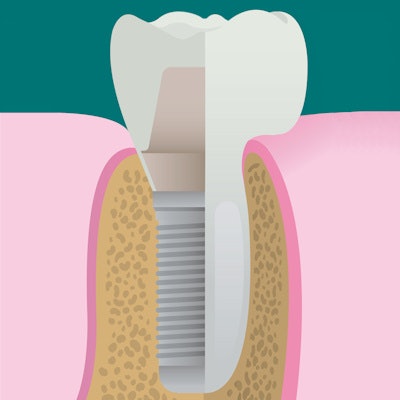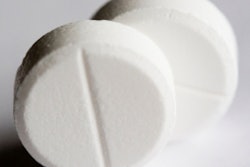
Postoperative pain is a reason many patients avoid implant treatment. Researchers wanted to see if giving patients a single dose of a nonsteroidal anti-inflammatory drug (NSAID) 15 minutes before surgery would reduce their postoperative pain intensity.
Patients given the NSAID (dexketoprofen trometamol) before their implant procedure reported less pain and less inflammation in the immediate postoperative period compared with a placebo group. The study was published in the Journal of Oral Implantology (January 22, 2018).
"The pre-emptive use of 25 mg of soluble [dexketoprofen trometamol] administered orally 15 minutes before implant surgery can reduce the severity of immediate postoperative pain," the study authors wrote.
The lead study author was Arturo Sanchez-Perez, MD, PhD, an associate professor in the department of periodontology in the Murcia Dental School at the University of Murcia in Spain.
Pre-emptive treatment
Dexketoprofen trometamol is a rapidly absorbed, prescription-only drug manufactured by Menarini and sold under the brand names Keral in the U.K. and Stadium in Mexico. In the study, the researchers exclusively referred to it as dexketoprofen trometamol.
There is some thought that it is necessary to treat pain before its onset rather than after the patient begins feeling it. The researchers wanted to see if giving patients a 25-mg dose of this NSAID 15 minutes before an implant procedure would reduce their postoperative pain.
“Pre-emptive analgesia reduces postoperative pain.”
"Pre-emptive analgesia reduces postoperative pain and the consumption of analgesics and appears to be the most effective means of decreasing postoperative pain," the authors wrote.
The study initially included 100 consecutive patients at a hospital in Spain. Each patient was given a local anesthetic of 20 mg/mL of lidocaine hydrochloride and 0.0125 mg/mL of epinephrine, but they were randomly assigned to either a test or control group (n = 50 each). Fifteen minutes before implant surgery, the test group received 25 mg of the NSAID, while the control group received 500 mg of vitamin C as a placebo. The same surgeon completed all procedures using the same implant (TiCare Inhex, Mozo Grau).
Among the 100 patients, 83 completed the study (there were eight dropouts in the control group and nine in the test group). Of those who completed the study, 54 were women, and the average patient age was almost 53 years.
The surgeon placed implants in all areas of the mouth:
- Anterior maxilla (from canine to canine): 10 implants
- Anterior mandibular region: 6 implants
- Premolar maxillary area: 26 implants
- Lower premolar region: 5 implants
- Maxillary molar region: 13 implants
- Bottom molar region: 23 implants
Ibuprofen (600 mg) was prescribed for the patients' postoperative pain relief. The patients began taking this two hours after surgery, so it did not interfere with immediate postsurgical pain perception, the researchers reported. They noted it likely influenced the patients' pain perception after this immediate period, however.
The researchers used a subjective visual analog scale to evaluate the patients' pain before and after the procedure. The patients who received the NSAID reported lower pain intensity during the immediate postoperative period, which was statistically significant. The average pain on the visual analog scale reported by the NSAID group was 3.75 compared with 8.52 by the placebo group. After this period, the researchers found no significant differences in the groups' pain intensity responses (see table below).
| Impact of NSAID on pain intensity from implant procedure | ||
| Time | Pain intensity in control group | Pain intensity in NSAID group |
| Preprocedure | 3.65 | 2.03 |
| Immediately after | 9.52 | 3.72 |
| 2 hours | 15.44 | 12.39 |
| 8 hours | 9.95 | 11.14 |
| 12 hours | 7.08 | 11.76 |
| 24 hours | 6.56 | 7.86 |
| 36 hours | 7.05 | 8.69 |
| 48 hours | 7.24 | 7.76 |
| 3 days | 6.89 | 7.61 |
| 7 days | 4.77 | 4.83 |
The patients in the NSAID group had less inflammation, but this group had somewhat more postoperative bleeding, according to the researchers. However, they found no differences in wound healing and no other reported complications between the groups.
Successful use
The authors noted that each patient had only one implant placed, which might have limited their pain compared with procedures involving more implants. They also reported that none of the patients had conditions that have higher rates of postsurgical complications, and the patients' levels of anxiety were not measured.
However, the researchers concluded that this class of drugs is effective at reducing postoperative pain.
"These data are in agreement with those published by other authors and demonstrate that the use of NSAIDs for short periods does not jeopardize dental implants in the early healing phase," the authors wrote.



















